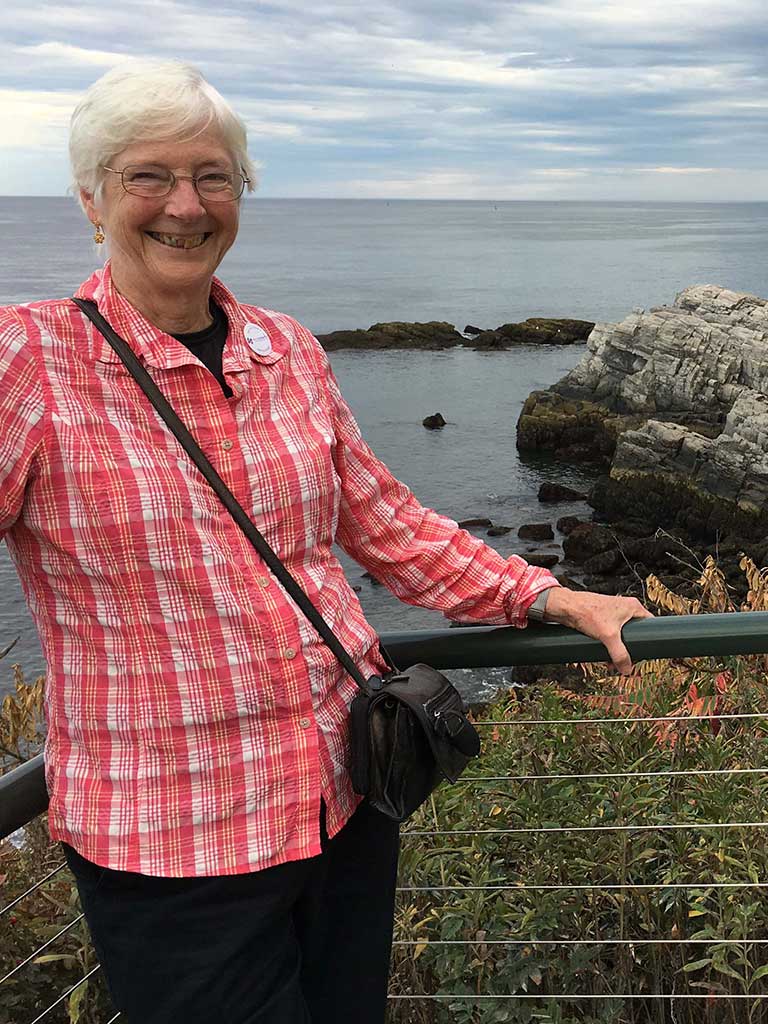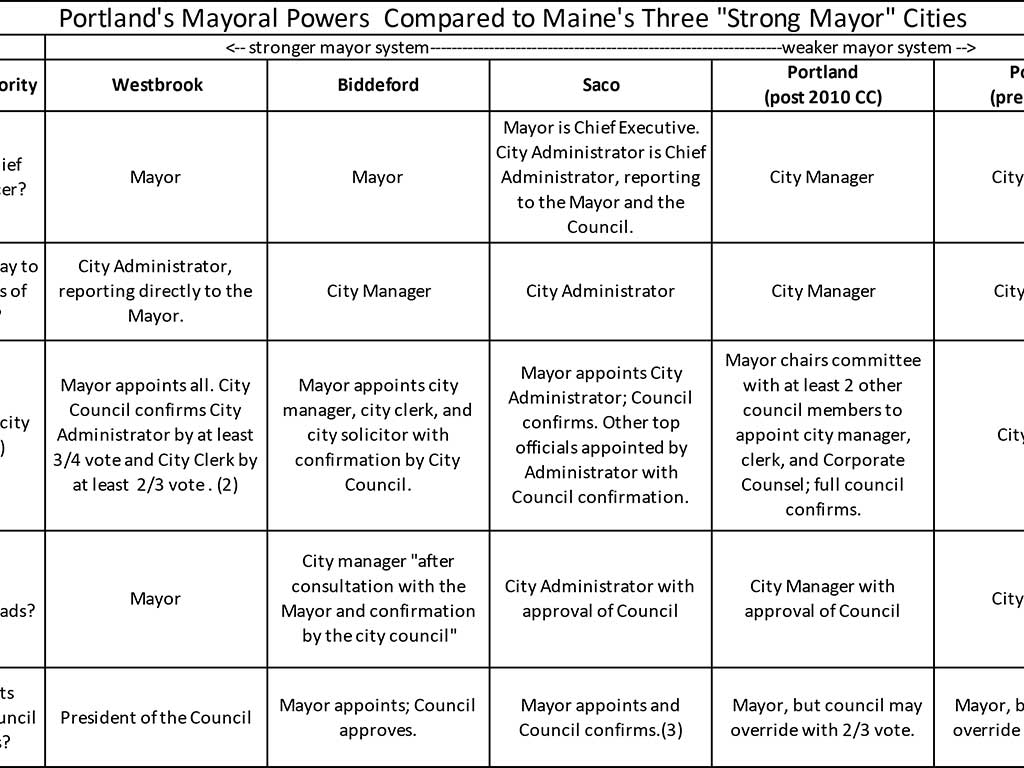Every month PelotonLabs co-founder Liz Trice interviews a local community member. This month, Liz caught up with Valerie Kelly, who is leading the League of Women Voters’ Portland Charter Commission Research Team. Her background includes 30 years of policy research in Africa. She also participated in League studies on U.S. agricultural policy and Maine issues such as presidential primaries and citizens’ initiatives.

What’s the League of Women Voters doing with the Charter Commission?

Before commissioners were elected, we created a questionnaire for candidates and reported their responses on our Vote411.org website. We organized a forum with the Portland Public Library and involved people who were on the 2010 charter commission.
After the charter commission started meeting, we began a monthly newsletter sharing progress and links to reading material.
Our research and advocacy are two-pronged:
- Drawing on advocacy positions established by past studies on topics such as Clean Elections, Money in Politics, and Ranked-Choice Voting; and
- Conducting new research on topics for which we have no established positions.
For the new research, we are not planning to take positions, but are assembling information to share with voters and charter commission members. We are currently studying how different cities across the US structure municipal government. We want to understand the pros and cons of strong versus weak mayors and what research shows about city council structure (e.g., the number and composition of city council members).
We’ve created a summary table of mayoral powers to compare Portland to other cities in Maine.

View the Mayoral Powers Comparison Chart at the League’s Charter Commission website under the “Our Research” tab.
During campaigns, opinions are often over-simplified. We’re hoping that by providing this information there will be more thoughtful conversations about what powers to give to Portland’s mayor.
The previous Commission had a paid researcher working for them. So far, this commission does not. The commissioners are addressing many complex issues in a very limited amount of time. Decisions they make about government structure will have broad repercussions. So, we hope that sharing our research with both voters and commissioners will contribute to an improved charter that meets Portland’s needs well into the future.
Can you give me some juicy tidbits?
This type of research doesn’t lend itself to “juicy tidbits.”
It’s hard to find good research that provides clear guidance on municipal government structure. Often the answer is: “It depends!”
The National Civic League has a document with guidelines for charter commissions that describes what should be done via a charter commission versus through legislation – the ordinances that the council votes on. Many of the ideas discussed during the election were about specific policies. But if you put too many details about policies into the charter, it can impair the ability of future mayors and city councils to address new issues, requiring additional charter revisions.
Typically, the charter specifies the key people making decisions, and the lines of authority. For example, the specifics of how to handle something like police oversight and budgets would be contained in legislation. While the question of “to whom the police are answerable” (e.g., mayor, manager, council) and the establishment of a police oversight committee could be in a charter.
In terms of city council size, 78% have five to seven members.
Under five is often not representative and anything over eight or nine becomes unwieldy. Though New York and Chicago manage with 30-50 members, so the “it depends” is relevant here!
Council elections tend to be at-large or by district. At-large positions have come under fire nationally because they were used to deny minorities seats in state legislatures and local councils. In several civil rights cases the Supreme Court ruled that at-large seats had to be replaced by district seats.
Portland has a mix of at-large and district seats – a reasoned approach. Councils elected with exclusively at-large seats tend to poorly represent minority populations. While exclusively district seats can mean there’s no one who is incentivized to look at what is best for the whole city.
Some cities are moving toward multimember district seats where there are fewer districts, but two or three representatives elected from each district via ranked-choice voting. This is a new approach that our commissioners might want to explore. Initial reviews suggest it contributes to better representation of women and diverse interest groups (e.g., ethnic, religious).
What are you learning about mayor and city manager roles?
In 2009 Portland created an elected mayor position but left a significant amount of authority in the hands of the city manager. Now many people want the mayor to be stronger, and some propose getting rid of the manager entirely. But it doesn’t make sense to expect an elected mayor to lead the city on developing policies, fulfill all the representational and ceremonial responsibilities, and also take care of the day-to-day details of running a city. Do you really want the mayor spending time supervising trash collection?
The commission could recommend that the mayor appoint department heads and prepare the budgets (currently tasks of the manager). But the city would still need an administrator coordinating the departments on a day-to-day basis. Westbrook, which has a stronger mayor than Portland, still has a city administrator in charge of day-to-day operations.
The National Civic League (NCL), an organization that advises cities on best practices, recommends a Chief Administrative Officer (CAO) appointed by and responsible to the mayor but approved and overseen by the Council.
The NCL notes that “…without a CAO the mayor is likely to be overwhelmed by the multiple tasks of being a leader of the community, a communicator with the council members individually and collectively, and an internal executive who can provide comprehensive administrative leadership.” Also, a CAO validated by the council provides some checks that keep a mayor from using the office to promote his/her own ambitions.
Do you see a place for more global statements on climate change or economic justice?
Charters sometimes have a preamble that lists the values that we’re aspiring to: equity, taking care of the poor, protecting the environment, for example. But you don’t want to put something specific in the document about how you’re going to do that. The details of how we get there are usually arrived at through legislation.
We need more people to help do this research. Send an email to portland@lwvme.org if you are interested in joining us.
Learn More
League of Women Voters Charter Commission info:
https://www.lwvme.org/CharterCommission
City Charter Commission website:
https://www.portlandmaine.gov/2665/Charter-Commission-2020-2022
City’s link to 2009/10 Charter Commission Documents:
https://www.portlandmaine.gov/329/Portland-Charter-Commission
PelotonLabs is a coworking space in the West End of Portland, Maine with a mission to connect and encourage people working on their own to manifest their visions without fear.
PelotonPosts is created by PelotonLabs. WEN provides column space without charge. PelotonLabs has been a paid advertiser. WEN publisher and editor Tony Zeli is a coworking member at PelotonLabs.





